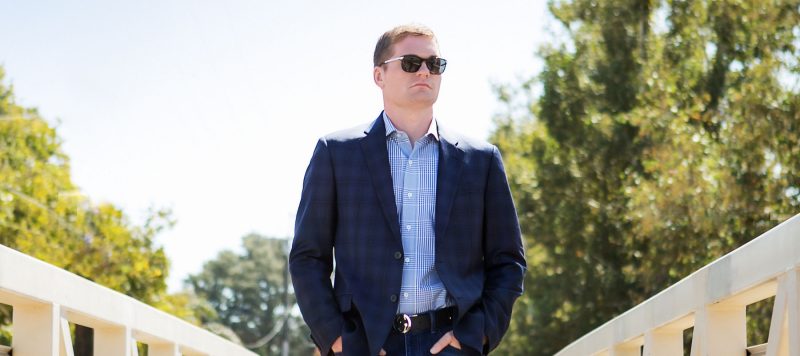In 2011, Jason Fladlien co-founded digital sales and marketing firm Rapid Crush. In doing so, he transferred the knowledge and experience he had learned from selling online using webinars to help create the ultimate sales and marketing company. The entrepreneur had spent years crafting and perfecting the art of the webinar and helped thousands of clients pitch their products to the public. Simultaneously, Fladlien became the world’s leader in webinars.
Fladlien wanted to do even more for clients than simply market and create great webinars. His drive to sell products for clients launched Rapid Crush, and since its creation, the company has made over $100,000,000 in webinar sales. Fladlien is still driven to create and succeed, and he isn’t ready to relinquish his title as the “Best Webinar Presenter on the Planet” just yet.
Jason, you are called the “Best Webinar Presenter on the Planet”. Firstly, how did you get involved in webinars?
Webinars are an amazingly effective, if not the best, online sales tool that exists today. I saw in their infancy that they were poised to become a great way to sell online, and I focused on perfecting the webinar as a way to sell products and services. So, “What exactly is a webinar?” you might be asking. A webinar is essentially a video and audio presentation that first teaches a concept (gives value in advance) and then pitches a product or service. It’s similar to a live speaking presentation where there is a pitch at the end, but a webinar tends to be more rapid-paced. You can do a webinar from anywhere in the world with a good Internet connection to an audience that never has to leave the comfort of their home or office. It’s the epitome of selling one-to-many.
Over the years, I’ve presented thousands of webinars for myself and some amazing collaborators and clients. Presenting that many webinars helped me design and master the webinar as a selling process. I first started down the path to webinar mastery by noticing another marketing strategy.
I saw the teleseminar craze hit hard back in 2006. There weren’t a lot of people making huge sums of money back then on the Internet. However, there were some really good salespeople who put on these virtual teleseminars where people would dial in from their phones. They could go to a website, which was essentially a static page with information, while listening to the presentation from their the phone.
I watched Internet marketing pioneers like Alex Mandossian and Armand Morin do these teleseminars, and they would come on the line, cover a topic, and give you really good information for 30 to 45 minutes; then they’d pitched the heck out of you at the end. They’d make a bunch of money in a very short period of time. The guys that were leading the charge back then were making six-figures each time they did one of these 60- to 90-minute teleseminars.
I had this feeling that teleseminars were just an interim type of technology to bridge the gap between non-interactive static web pages and full-blown virtual interaction with video and audio. I sensed that teleseminars were going to peak and lose their effectiveness because they were a transitory technology. They were a placeholder until the Internet connection got better for the average user. So, I didn’t want to try to go in there and do what they were doing. I wanted to get ready and sharpen my ax to chop down the next tree, which was the webinar.
Webinars did exist back then, but they sucked. The technology didn’t work; the Internet connections were so weak you couldn’t stream video very effectively. I believed that webinars would be a hit in the future. If these guys were doing so well with teleseminars, I believed that it would work even better with webinars.
When the webinar technology switched over and started becoming de facto, I was able to spearhead that movement. The guys that were leading the teleseminar technology couldn’t make the adjustment because they were too set in their ways. So, I was able to take this new technology where nobody was a leader, anoint myself as a leader, and maintain that leadership through results. I’ve sold millions and millions of dollars of products and services on individual webinars since then.
Thanks to working with some amazing clients, Fladlien perfected the webinar over the years. His expertise has grown due to the thousands of webinars he has produced, which in turn, have sold millions of dollars in products and services for clients.

You’ve created webinars for people like Shark Tank’s Kevin Harrington to top motivational speakers such as Bob Proctor and Zig Ziglar to world-renowned Internet marketers such as Joe Polish. How did that come about?
The company was founded on selling in a one-to-many fashion. So, you could really say that Rapid Crush grew up doing webinars. I learned about selling on a webinar by doing them over and over across the years. When you do thousands of webinars, you learn to master the sales approach that gets the results you are looking for. Someone buys what you are selling. We have been very fortunate in that our webinars have done well. By consistently setting records, we developed a reputation for being excellent at supporting our clients, and I developed the reputation of being the best webinar sales guy in the world. You do that time and again, and folks like Kevin Harrington, Bob Proctor, and Joe Polish pay attention. We’re blessed to get to work with them.
In the past, you have said that it is important for webinar viewers to commit to things. Can you explain what you mean by this and how commitment improves selling?
When somebody says yes to something, then they are more likely to act in a manner consistent with what they just agreed to. Even though it seems annoying and manipulative, “Who here wants to make more money? Raise your hand,” works with people.
I learned about this from the book Influence by Robert Cialdini, where he talks about commitment and consistency in that principle. One example he shares is about prisoners of war who were captured overseas. Their captors were trying to brainwash these American soldiers to become communist sympathizers. They would just have them write down communistic rhetoric, and they said, “You don’t have to even agree to it. Just write it down and sign your name to it.” What they discovered was the people who they could get to write down and just simply copy some communist propaganda were more likely to start acquiescing their position on capitalism. They were more likely to sympathize with their captors simply by writing something down. Writing something down is a commitment.
More recently, Cialdini wrote another amazing, groundbreaking book called Pre-suasion, which took it a step further. I’ve met Cialdini and spoken on stage with him, and he is an incredible genius when it comes to persuasion. He discovered that if you were to ask somebody, “Do you consider yourself an adventurous person?” If they said yes, they would be more likely to go out on a date with you if you then asked them, “Would you like to go out on to a date with me?” Just by first simply asking them if they were an adventurous person.
Here’s what’s really interesting about this concept. Say you’re at a cocktail party, and at the beginning of the night, you run into somebody and say, “Hey, do you consider yourself a cautious person?” They would say, “Yes.” This is because they would think of a time when they were cautious and that would reaffirm their reality. Now, you could see them four hours later and ask them, “Are you an adventurous person? Are you a risk taker?” And they would say yes to that, even though they can’t be both cautious and a risk taker. How can they both be this thing and the exact opposite of that thing? Well, it turns out that there are selective instances where their brainwave will focus on reaffirming something if they commit to it. So, unless we get somebody to commit to something, it’s very hard to change how they view the thing that you’re trying to persuade them to change.
If somebody can’t commit to taking action to solve their problem, what are the chances of them actually solving their problem? It’s almost nonexistent. If you’re selling a product that helps them alleviate a pain or solve a problem, and you don’t get a commitment from them to take action to solve their problem, you make it way harder to sell your product.
If somebody believes that they lacked confidence and that confidence is what stops them from solving their problem, until you deal with the confidence, you will not be able to sell them very easily because that’s a huge sticking point. That’s a constraint. If you’re trying to sell them on the benefit of the product, but you’re missing this issue of competency, you’re done for. If you can get somebody to commit that even if you’re not confident yet, you can still see how doing x, y, and z can help you solve this problem. “Will you commit to me to do that? Regardless of whether you feel confident or otherwise? Will you commit to me that if you see something that makes sense, that you will act upon it?” And the answer to that is yes.
Everybody will say yes to that, but here’s where it’s brilliant. You’ve now put them in a new state of mind that has bypassed this limitation that would prevent them from taking action. Taking action could be to change their behavior or to get them to buy something that normally they wouldn’t buy. It’s such a powerful tool to get something down in writing or having something verbalized.
Here’s the brilliance of webinars. I can see the response in the chat box. One of my favorite commitments is teaching a four-step process on a webinar, and I can say, “Listen, we’ve only covered two of the four steps now, but if we stopped the webinar right now, right here, do you feel way more sure of yourself to go out there and be able to accomplish blank?” Everybody says yes. I get them to commit. I get them to admit that even though they’ve only seen half of everything that I’ve shown them, they feel so much better and optimistic about their chances. Can you imagine how that will influence that person at the end of the webinar when you pitch them? When I show them the other steps, if those first steps were good and I already agreed that this was amazing and this was powerful and this was effective, and then I show you the rest of it and it’s even better, that’s a sale that almost makes itself at that point in time. If I just show you something amazing, but don’t get you to agree or commit to me that yes, what you’ve seen can be life-changing or yes, what you just showed me could be the difference, it can very easily go in one ear and out the other ear. That’s something that we never want to have happen on webinars or sales in general. Getting that conscious commitment is the big difference between those who make sales and those who don’t.
Although Fladlien is known globally for his webinars and it seems what he was born to do, it wasn’t his original passion. He has, however, always enjoyed being in front of people, and his previous career is a testament to his desire to be on stage. It also shows Fladlien has always had a way with conveying words to an audience.

Before getting into your current webinars and marketing role, you were a rapper and devoted Hare Krishna monk. How did you get started in that realm and how deep into the music world did you dive?
Everything I do for any period of time, I get deep into. I have one of those obsessive personalities. I actually started writing rhymes and performing as a rapper when I was around seven years old. That’s always been a part of who I am as an individual. I started doing performances in middle school. In high school, I’d be rapping during the halftime at football games. I’d always perform at parties and dances.
I was fascinated with music. I started producing and writing music, learning how to engineer, mix, master, do all the production for music, and how to play instruments later on. Then, I hit this rock in my life where I was 18. I was depressed and having panic attacks. I felt like I should have accomplished a lot more in life. It is funny in retrospect because I was beating myself up for not having made significant accomplishments by the age of 18. However, that’s how I felt at that time; I was in a rut. One of the musicians that I worked with was this guy who used to be a Hare Krishna monk. We were supposed to start producing and recording an album and start a record label. As part of his beliefs, he was a vegetarian. I didn’t know much about it, so one day, I started researching vegetarianism online. While doing so, I came across some information about Hare Krishna. As I learned more about the Hare Krishna philosophy, one point deeply resonated with me with its simplistic, yet profound impact on my daily life. When we are presented with a new approach, we try it. If it works, we continue to do it. That is all you have to do. That made sense to me, so I decided to give the Hare Krishna philosophy a try.
Immediately, I noticed that I felt relief and wasn’t having panic attacks anymore. I could concentrate and had more focus and discipline. I wasn’t treating the music as something that was a hobby; I took it more seriously. I went all in on the music and all in on being a monk simultaneously. My life for four years was focused on meditation, chanting, and reading scripture and then writing, recording, and performing music. That was my whole life. I got out there, launched a record label, and put out an album. Then everybody who was supposed to help me just disappeared. I’d invested my whole life and my savings into this and wanted to make it work. So, I asked myself, what makes music and a record label successful? That’s when I stumbled on marketing, and I found it fascinating.
How did you go from the music world into digital marketing and webinar presentations?
When I really started doing business online, I didn’t have a bed. I slept on the floor for a while because I didn’t have enough money. Essentially, I’d spend 10 to 14 hours every single day, six to seven days a week for four years straight, putting it all into the music. I put all the money into the music, but I thought maybe I’d get some breathing room through marketing.
I started trying to market my own stuff. SEO (Search Engine Optimization) was a huge part of it. I built a website and tried to get rankings for certain terms, so that when people would search for new music, I’d be there. I was putting out the music, trying to market on social media, doing press releases to try to build the hype, calling into radio stations to try to create demand, trying to get gigs booked at college radio stations just so that I could make money, because at that point, I was broke. I had my CDs distributed through a company called CD Baby. That was the first way an independent musician could get on iTunes, which was a brand new thing back then. I’ll never forget the first time a girl told me, “I’ve got you on my iPod.” I thought, “Oh my God, this is the future!”
I got really good at building websites. I got really good at doing email marketing to my tiny little 100 or 200 newsletter subscribers. I got really good at understanding the mechanics of marketing. Then, I would look at all these guys who I learned from who were making hundreds of thousands of dollars a year doing this online. They made it obviously appear as easy as it possibly could because they were selling stuff. I thought to myself, “Why don’t I just make all this money with online marketing and then pour it into the record company?” So, I started putting less into music and more in this online thing and then it just got so frustrating to me that I couldn’t make it work with music.
The marketing of the music became more interesting than the music itself. I didn’t want to be constrained with marketing entertainment because entertainment seems to be too hard to market. It seems to be too much of a guess. I’d rather be a marketer who markets solutions to problems that are not entertainment related or real specific physical products that could totally help somebody or change somebody’s life. That marketing is easier, and it seems to be more lucrative in general. That was my whole arc from musician to monk to marketer.
Fladlien was able to learn from his own experiences after hitting a “rock” in his life. Now, he has come out on the other side as a success in the marketing industry. Although he felt like he hadn’t achieved certain goals at the age of 18, Fladlien used that to reach the point he is at today. He remains motivated to move away from pain to reach the pleasure of success with all that he does.

Do you see mental health issues as being a major barrier for other entrepreneurs in the world today?
I think it’s almost a prerequisite that you have to have something wrong with you if you’re going to be an entrepreneur. Unfortunately, a lot of what drives somebody to do something as crazy as being an entrepreneur comes out of some sort of traumatic experience or some sort of pain. Here’s the reality. We are far more motivated to move away from pain than we are towards pleasure. This is a fundamental persuasion principle that I utilize as much as possible in my own business because this is human behavior.
The entrepreneur is often somebody who got picked on in school and was an outcast because their brain doesn’t operate the same way as everybody else. In order to make up for that neglect or being ostracized or not fitting in, they embrace standing out instead. Lo and behold, that’s a huge quality of an entrepreneur. The beautiful thing is the entrepreneur couldn’t follow the trend, so they had to buck the trend. They had to come up with their own solution.
No amount of success can heal a traumatized wound. No amount of success can replace a traumatic experience or an emotional trauma that hasn’t been dealt with properly. So, sometimes what happens with the entrepreneur is that their success does not make them feel better, but the emptiness of achievement continues to make them feel like more achievement is going to solve the problem. Ultimately, their success will overwhelm them. They’ll feel even more isolated, they’ll feel even more out of touch. As an entrepreneur, once I accomplished a certain level of success and developed certain character traits that were really powerful, it became a lot easier for me to transform those into dealing with the real issues that underlie some of the motivation for me to want to get rich. So now, I can deal with the trauma. If you truly face your past and trauma, you will become a better entrepreneur. You will become a better leader.
In 2011, Fladlien transitioned from webinars and digital marketing and into co-founding Rapid Crush. He had learned a lot about clients and products in the years prior and it motivated him to do more. With a customer-first philosophy, Rapid Crush is helping thousands of clients attain life-changing success.

Jason Fladlien and Wilson Mattos, co-founders of Rapid Crush, Inc.
You opened Rapid Crush after years of working on webinars and in digital marketing. What did you learn during all those years of work that inspired you to co-found Rapid Crush?
I’d done pretty well for myself before I partnered up with Wilson Mattos, who I created and co-founded Rapid Crush with, in 2011. I got tired of selling information products where the average person didn’t get an outcome. They’d pay me money for my product, and then six months later I’d ask, “Did you make your money back?” And they’d say, “No,” and that just drove me nuts.
Why is it that so few people could buy a product that’s information related and not be successful? I’m not talking 50/50. I’m talking, on average, 97% failure rates on really good products. I found it seemed like no matter how good the product was, it did not seem to have any relation to the outcome of success. So, instead of selling them information, I decided to focus on software. My thought was, “If they can’t do something that is limiting their success, I can have a tool built that does it for them.” That was the theory I was operating from.
I didn’t know how to program software and didn’t want to learn how to program software. I had attempted before to create a couple of pieces of software and just failed miserably. So, I partnered with somebody who could develop and operationalize the software. Wil is a genius when it comes to software and the systems required to develop it properly.
I would come up with the idea. I knew what the software should be, what result it should get, what it should look like from a user perspective, and what would make that thing sell. Then Wil would create it, have it developed, and have it operationalized so it could be supported. Then, I would develop a pitch for it and we’d knock out a new software every single month. It was great. That’s how we got into software. That’s how Rapid Crush came to be.
What happened soon after is that by accident we stumbled on a magic formula that changed everything. We were now creating, deploying, and selling software and creating and selling information. Our product launches became huge. The Product Launch Formula for information products, created by Internet marketing pioneer Jeff Walker, where you are doing these big orchestrated mega-launches was in vogue at the time. What we would do is we’d find these launches and if they were largely information-based products, we would develop software and that was our bonus. Or we’d find these launches that were largely software based, and we would develop the information as the bonus. We’d make it exclusive content to that launch and only available if they bought through our affiliate link. “You can’t buy this information anywhere else, but you can get it for free if you buy this product that is being launched.” That’s where we really got famous. That’s when the company really took off. That’s what helped lead to over $100,000,000 in webinar sales.
Essentially, we were ambidextrous; we could create and sell software and we could create and sell information. That allowed me to fine tune and learn more about persuasion and then put it into my webinars. Over time, we systemized the whole thing. We then turned that system into our own webinar training program to help others replicate our results with webinars and established ourselves as the people who could teach other people how to do webinars.
How can Rapid Crush improve a business and make it more successful?
We recently started developing full webinars for our clients. That includes everything from structuring the webinar, to developing the slides, choosing the right offer, developing the right pitch, to coaching on how to deliver the webinar and in some cases, such as with deals like the one with Kevin Harrington, I’ll deliver the webinar presentation for them. We’ve had the leading webinar training program called Genius Webinars™, that we developed with top internet marketer Joe Polish, for a few years now, but we realized that some of our clients just want the webinar developed for them using our webinar development system. That has been very successful in the short time we have had it available, and our clients have been getting huge returns on their investments. One solid webinar can be game-changing for a business, no matter the size of the business.
Here’s another way to look at it. Pitch or product, which is more valuable in the short-term? The answer is undeniably the pitch. The world is filled with fantastic products that nobody knows about.
I’ve seen this mistake made a million times, where someone spends years building the perfect product, but they don’t have a plan. I’ve worked with clients who have already spent ten to fourteen million and several years of their life developing the perfect product and then struggled to sell it. You should always develop the marketing plan and pitch before you even develop the product, and a webinar is the best way to sell a product or service online.
As a successful business owner, you could get the training and try to create a webinar from scratch yourself, but think about this, I was talking to a client the other day who is one of the top ten in the world of webinar presenters. He could develop the webinar himself, but he would much rather just have it be one less thing he has to deal with. Rapid Crush takes this extra burden off your chest and puts it on our own. So, if someone like him, who is an expert at webinars, realizes the value of having us develop his webinars for him, does it make sense for you to do all the learning and all the work or does it make sense for you to finally allow yourself some breathing room so you can make more money and work less by outsourcing or delegating it?
You have an incredible track record of creating products and services. As an entrepreneur, it must be hard to stop creating. What plans do you, or Rapid Crush, have for the future?
Rapid Crush is always looking for ways to support business owners and entrepreneurs reach new heights and find greater success whether that’s through the software we develop or our webinar training and creation. We’ve seen firsthand the transformations that can take place with businesses of all types when webinars are used to sell products, services, and information.
On one hand, we have a demand for clients for our webinar services, and we’re now approaching capacity. On the other hand, I have a bunch of people who want to learn how to pitch like me. So, we are starting to certify these people to develop, create, and be hired guns to pitch and sell webinars.
The more certified partners we have, the more we can pick and choose the right fit for a client. If a person is really good at selling health stuff, we can pair them with a health client. If another person is really good at services, we’ll pair them with a client who is selling their services. Here’s what’s great about this. The more we can add value to the client side, the more clients we get. The more clients we get, the bigger the demand goes up for our certification partners, the more of them want to come in because it’s easier for them to get leads and make money right away. It means a more tailored experience for our clients and the ability for us to fulfill at a larger capacity than we have been able to in the past.
Fladlien and Rapid Crush continue to change the marketing sphere, but what else should be expected from the creative entrepreneur? While some online marketers were unable to change with the times and continue their success, Fladlien has developed, adapted, and evolved over the years. He has made changes to his career to become even more successful and fulfill the entrepreneurial drive inside of him.
While at 18-years old Jason Fladlien felt like he hadn’t achieved many goals, now older and wiser, he sees things much differently. Yet, Fladlien would have never reached his current level of success without hitting the “rock” he did as a teenager. From rapper to Hare Krishna monk to successful entrepreneur, Fladlien has done a lot in his young life and accomplished many of the things he has set his mind to. A successful music career may not have been on the cards, but a prosperous life in marketing was.
If you’re curious about whether a webinar would be a good marketing tool for your business and you want to learn more, you can watch a free webinar Fladlien created for you and see first-hand how he uses webinars to sell at www.RapidCrush.com/totalprestige

From left to right: Jason Fladlien, CSO of Rapid Crush, Inc., Doland White,
CEO of Rapid Crush, Inc., Wilson Mattos, COO of Rapid Crush, Inc.

Journalist and author. Contributor











